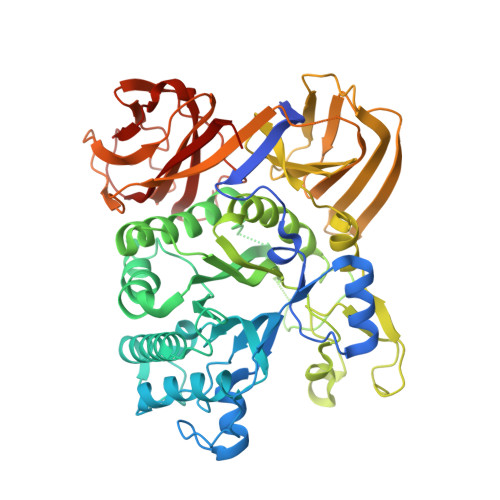Bacteria of the human gut microbiome catabolize red seaweed glycans with carbohydrate-active enzyme updates from extrinsic microbes.
Hehemann, J.H., Kelly, A.G., Pudlo, N.A., Martens, E.C., Boraston, A.B.(2012) Proc Natl Acad Sci U S A 109: 19786-19791
- PubMed: 23150581
- DOI: https://doi.org/10.1073/pnas.1211002109
- Primary Citation of Related Structures:
4AW7, 4AWD - PubMed Abstract:
Humans host an intestinal population of microbes--collectively referred to as the gut microbiome--which encode the carbohydrate active enzymes, or CAZymes, that are absent from the human genome. These CAZymes help to extract energy from recalcitrant polysaccharides. The question then arises as to if and how the microbiome adapts to new carbohydrate sources when modern humans change eating habits. Recent metagenome analysis of microbiomes from healthy American, Japanese, and Spanish populations identified putative CAZymes obtained by horizontal gene transfer from marine bacteria, which suggested that human gut bacteria evolved to degrade algal carbohydrates-for example, consumed in form of sushi. We approached this hypothesis by studying such a polysaccharide utilization locus (PUL) obtained by horizontal gene transfer by the gut bacterium Bacteroides plebeius. Transcriptomic and growth experiments revealed that the PUL responds to the polysaccharide porphyran from red algae, enabling growth on this carbohydrate but not related substrates like agarose and carrageenan. The X-ray crystallographic and biochemical analysis of two proteins encoded by this PUL, BACPLE_01689 and BACPLE_01693, showed that they are β-porphyranases belonging to glycoside hydrolase families 16 and 86, respectively. The product complex of the GH86 at 1.3 Å resolution highlights the molecular details of porphyran hydrolysis by this new porphyranase. Combined, these data establish experimental support for the argument that CAZymes and associated genes obtained from extrinsic microbes add new catabolic functions to the human gut microbiome.
Organizational Affiliation:
Department of Biochemistry and Microbiology, University of Victoria, Victoria, BC, Canada V8W 3P6.





















